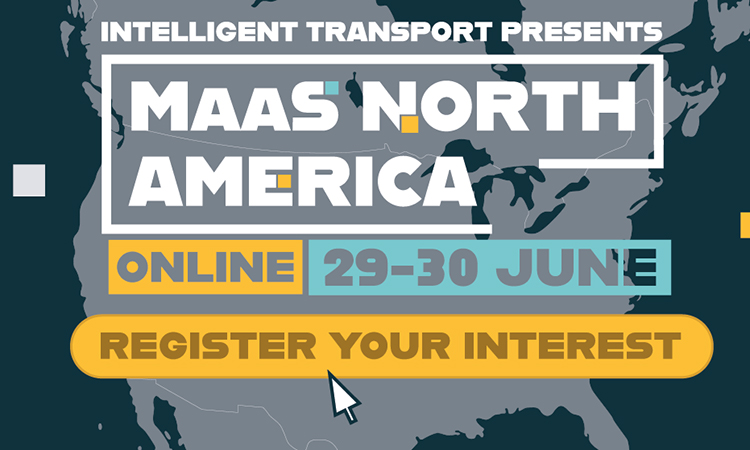Maas North America 2021: A sneak preview
- Like
- Digg
- Del
- Tumblr
- VKontakte
- Buffer
- Love This
- Odnoklassniki
- Meneame
- Blogger
- Amazon
- Yahoo Mail
- Gmail
- AOL
- Newsvine
- HackerNews
- Evernote
- MySpace
- Mail.ru
- Viadeo
- Line
- Comments
- Yummly
- SMS
- Viber
- Telegram
- Subscribe
- Skype
- Facebook Messenger
- Kakao
- LiveJournal
- Yammer
- Edgar
- Fintel
- Mix
- Instapaper
- Copy Link
Posted: 10 June 2021 | Joshua Minchin - Intelligent Transport | No comments yet
Ahead of Intelligent Transport’s Maas North America online conference, Junior Editor Joshua Minchin speaks to three of the participants to get a sneak preview of what they are hoping to discuss at the event at the end of this month.


What is MaaS? It’s a question we at Intelligent Transport have asked ourselves plenty over the last few years, and to be honest we still don’t have an answer. Mobility-as-a-Service, or MaaS, represents the very cutting edge of an industry which is having to adapt at a rate of knots to ensure it continues to survive and thrive, and nowhere is this more true than in North America.
In just a couple of weeks’ time, we’ll be gathering some of the great and good of North American transit to discuss MaaS at length in our two-day MaaS North America online conference. In order to sate my excitement for what is going to be an extremely interesting couple of days, I spoke to a few of our speakers ahead of time to get a sneak peek into their vision for MaaS in North America, and find out what they think the big talking points at the event will be.
Why is MaaS important?
Anyone that’s read an issue of Intelligent Transport or perused the website will have seen the term MaaS plastered just about everywhere. It is a concept that is constantly evolving and essentially stands for a new way of thinking about the way we move people around some of our most populous cities. But what’s all the fuss about?
“MaaS is essential to the North American transit industry and is without a doubt the future of transit,” said Manish Chaudhari, Senior Director, Special Programs at LA Metro, who will be speaking on Day Two of the conference.
“The pandemic that started last year showed just how connected we are – not only as people, but in the technology that we use. Now, what if we could make that connection more seamless? Wouldn’t that be better? I believe so. Technology in the transit industry is advancing at an extremely rapid rate and we need to keep up with that. MaaS is one of the most efficient ways to do just that.”
It’s fair to say that, as a continent, North America has not always been at the forefront of transit innovation. Things that travellers in some European cities take for granted, such as contactless payment, are only now beginning to make their way into North American towns and cities. Jean Ruestman, Administrator, Office of Passenger Transportation at Michigan Department of Transportation, believes the continent’s love affair with one particular mode of transit has affected progress in the past.
“North America has long been focused on the personal automobile as the ultimate mobility solution, but MaaS has the potential to transform the way people think about mobility,” Ruestman said, ahead of her appearance on of the conference.
“Meeting people’s mobility needs requires partnerships and integration of services. MaaS provides the framework for public transit to be part of a complete trip that includes seamless planning, multiple modes, and equitable payment options. MaaS can reinforce the important role that public transit plays in the mobility ecosystem.”
Similarly, it is new MaaS solutions, not the car, which will deliver crucial results on climate goals that simply have to be met in the coming decades to avoid irreversible environmental change.
“Shifting the paradigm of how people move around in the US is crucial to achieving our climate goals, and providing increased and improved transportation options is a major part of this,” said Sam Morrisey, Executive Director of Urban Movement Labs, who will be speaking on Day Two of the event.
“MaaS truly changes the current model of vehicle ownership, making it possible for people to meet their mobility needs with more choices and at a lower cost and with a reduced climate and emissions impact,” he added.


Contactless payment is beginning to be rolled out across the US
So, what’s going on right now?
With all that in mind, I also asked our three speakers what exciting MaaS projects they were working on right now, as transit innovation across the continent continues to motor onwards.
“I’m excited to be involved with a project to provide a MaaS platform for the state of Michigan that will allow easy access to information about mobility options across our state,” revealed Ruestman.
“It will also ensure mobility service providers a means of reaching all their potential customers. The Michigan Department of Transportation’s goal in launching this platform is to improve mobility in our state and to alleviate the risk associated with such an endeavour by giving the model time to succeed and hopefully become self-sustaining.”
Chaudhari was able to reveal an equally as exciting project in the works at LA Metro too: “We are currently in the planning stages of a state-funded grant project called CARB-Step.
“This project is geared toward low-income patrons in the South Los Angeles area. TAP will provide a technical solution that we are calling the Mobility Wallet, which will be loaded with subsidised funds that the grant participants can use on any of our integrated mobility partners’ services – be it the bus, the train, rail, a scooter, bike, or private ride-hailing service. The patron gets to use their funds in a way that best serves their needs. We hope that this project will kick off the larger MaaS movement throughout Southern California.”
Urban Movement Labs is also working on a project in Los Angeles, with Sam Morrissey telling Intelligent Transport that “some of our current project sponsors are working with us and the City of Los Angeles to develop mobility solutions that can operate within the MaaS model. These include personal delivery devices (PDDs) that can solve the ‘last mile’ challenge of food and goods delivery, as well as new car sharing models focused on deploying ‘floating’ vehicles that reduce the need for individual vehicle ownership.”
What can you expect from MaaS North America?
All three of our speakers will be joined by other expert panellists during their respective sessions, as we look to drive discussion around some of the latest developments within the North American transit industry and spark debate among our attendees on our intuitive event platform.
Not wanting to wait any longer, I managed to get some insight into what each of our three speakers is most looking forward to discussing at the upcoming event.
“I am eager to discuss MaaS strategic planning and opening up a dialogue with my colleagues about some of the legal and technical hurdles that public transit agencies like LA Metro face,” revealed Chaudhari.
Meanwhile, Morrissey said that “as the Executive Director of a non-profit that works with both public and private organisations, I’m most interested in learning from the other speakers what the challenges and opportunities are as they relate to realisation of true MaaS options in Los Angeles and across the US.”
Finally, Jean Ruestman summed up the hopes of much of the transit industry in North America when it comes to MaaS: that it can deliver on its potential to truly change society and benefit all members of that society equally.
“I’m looking forward to engaging in a conversation about MaaS that will allow us to continue to develop a shared understanding of what it is and how it can best help society,” she said.
“There is still so much to learn, and discussing the demonstration projects and research will enable MaaS to evolve in a way that improves the lives of all people.”
Biographies


Sam Morrissey serves as Executive Director of Urban Movement Labs. With a professional career spanning a wide variety of transportation and mobility projects and initiatives across the US, Sam works at the intersection of transportation planning, policy, implementation, and operations.


Jean Ruestman is the Administrator of the Office of Passenger Transportation for the Michigan Department of Transportation where she has worked for over 29 years. In her current position at MDOT she oversees the state’s public transportation programs and provides strategic direction for navigating the quickly evolving mobility ecosystem.


Manish Chaudhari is a Senior Director for the TAP Smart Card Program at L.A. Metro. Manish is responsible for the program’s architecture which provides an elevated and modernized customer experience to over 10 million people, across 26 transit systems in the LA County region. Chaudhari has over 10 years of dedicated experience directing the implementation and deployment of software systems for complex transportation projects.
Related topics
Artificial Intelligence, Infrastructure & Urban Planning, Intelligent Transport Systems (ITS), Multimodality, On-Demand Transport, Passenger Accessibility, Passenger Experience, Public Transport, Sustainable Urban Transport, Transport Governance & Policy, Travel & Passenger Information
Related modes
Bus & Coach, Metro
Related cities
USA
Related organisations
LA Metro, Michigan DOT, Urban Movement Labs
Related people
Jean Ruestman, Manish Chaudhari, Sam Morrissey








